Max Stirner

Max Stirner
Johann Kaspar Schmidt, better known as Max Stirner, was a German philosopher. He is often seen as one of the forerunners of nihilism, existentialism, psychoanalytic theory, postmodernism, and anarchism, especially of individualist anarchism. Stirner's main work is The Ego and Its Own, also known as The Ego and His Own. This work was first published in 1845 in Leipzig, and has since appeared in numerous editions and translations...
NationalityGerman
ProfessionPhilosopher
Date of Birth25 October 1806
CountryGermany
No knowledge, however thorough and extensive, no brilliance and perspicuity, no dialectic sophistication, will preserve us from the commmonness of thought and will. It is truly not the merit of the school if we do not come out selfish.
The web of hypocrisy of today hangs on the frontiers of two domains, between which our time swings back and forth, attaching its fine threads of deception and self-deception. No longer vigorous enough to serve morality without doubt or weakening, not yet reckless enough to live wholly to egoism, it trembles now toward the one and now toward the other in the spider-web of hypocrisy, and, crippled by the curse of halfness, catches only miserable, stupid flies.
Then the necessary decline of non-voluntary learning and rise of the self-assured will which perfects itself in the glorious sunlight of the free person may be somewhat expressed as follows: knowledge must die and rise again as will and create itself anew each day as a free person.
The people is dead! Good-day, Self!
It is not recognized in the full amplitude of the word that all freedom is essentially self-liberation - that I can have only so much freedom as I procure for myself by my owness.
The State has always one purpose: to limit, control, subordinate the individual and subject him to the general purpose Through its censorship, its supervision, and its police the State tries to obstruct all free activity and sees this repression as its duty, because the instinct of self-preservation demands it. The State does not permit me to use my thoughts to their full value and communicate them to other men unless they are its own Otherwise it shuts me up.
We don't call it sin today, we call it self-expression.
He who is infatuated with 'Man' leaves persons out of account so far as that infatuation extends, and floats in an ideal, sacred interest. Man, you see, is not a person, but an ideal, a spook.
Christianity has aimed to deliver us from a life determined by nature, from the appetites as actuating us, and so has meant that man should not let himself be determined by his appetites.
The man is distinguished from the youth by the fact that he takes the world as it is, instead of everywhere fancying it amiss and wanting to improve it, i.e. model it after his ideal; in him the view that one must deal with the world according to his interest, not according to his ideals, becomes confirmed.
Spiritual men have taken into their head something that is to be realized. They have concepts of love, goodness, and the like, which they would like to see realized; therefore they want to set up a kingdom of love on earth, in which no one any longer acts from selfishness, but each one 'from love.' Love is to rule.
Man, your head is haunted; you have wheels in your head! You imagine great things, and depict to yourself a whole world of gods that has an existence for you, a spirit-realm to which you suppose yourself to be called, an ideal that beckons to you. You have a fixed idea!
The moral man is necessarily narrow in that he knows no other enemy than the 'immoral' man. 'He who is not moral is immoral!' and accordingly reprobate, despicable, etc. Therefore, the moral man can never comprehend the egoist.
Protestantism has actually put a man in the position of a country governed by secret police. The spy and eavesdropper, 'conscience,' watches over every motion of the mind, and all thought and action is for it a 'matter of conscience,' i.e. police business.